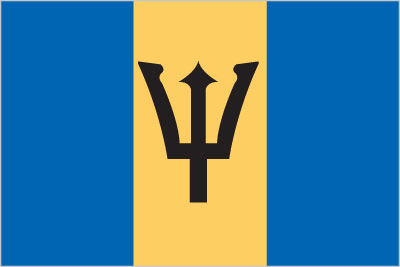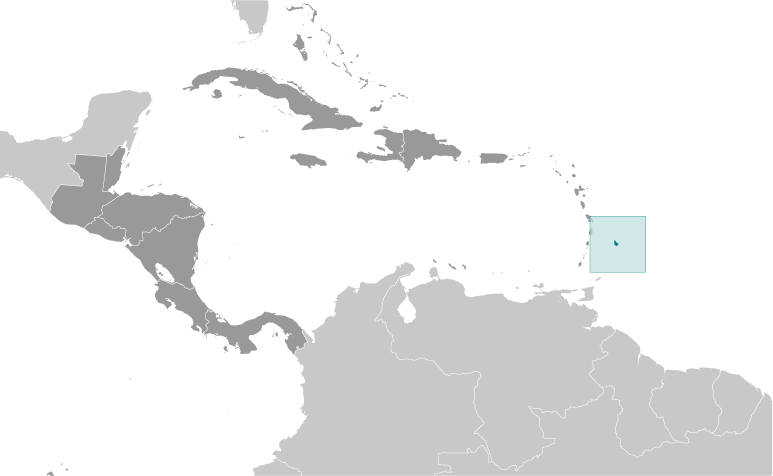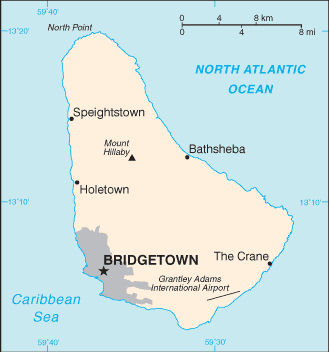Introduction :: BARBADOS
-
The island was uninhabited when first settled by the British in 1627. African slaves worked the sugar plantations established on the island until 1834 when slavery was abolished. The economy remained heavily dependent on sugar, rum, and molasses production through most of the 20th century. The gradual introduction of social and political reforms in the 1940s and 1950s led to complete independence from the UK in 1966. In the 1990s, tourism and manufacturing surpassed the sugar industry in economic importance.
Geography :: BARBADOS
-
Caribbean, island in the North Atlantic Ocean, northeast of Venezuela
13 10 N, 59 32 W
Central America and the Caribbean
total: 430 sq km
land: 430 sq km
water: 0 sq km
country comparison to the world: 202
2.5 times the size of Washington, DC
0 km
97 km
territorial sea: 12 nm
exclusive economic zone: 200 nm
tropical; rainy season (June to October)
relatively flat; rises gently to central highland region
lowest point: Atlantic Ocean 0 m
highest point: Mount Hillaby 336 m
petroleum, fish, natural gas
agricultural land: 32.6%
arable land 25.6%; permanent crops 2.3%; permanent pasture 4.7%
forest: 19.4%
other: 48% (2011 est.)
54.35 sq km (2003)
0.08 cu km (2011)
total: 0.1 cu km/yr (20%/26%/54%)
per capita: 371.3 cu m/yr (2009)
infrequent hurricanes; periodic landslides
pollution of coastal waters from waste disposal by ships; soil erosion; illegal solid waste disposal threatens contamination of aquifers
party to: Biodiversity, Climate Change, Climate Change-Kyoto Protocol, Desertification, Endangered Species, Hazardous Wastes, Law of the Sea, Marine Dumping, Ozone Layer Protection, Ship Pollution, Wetlands
signed, but not ratified: none of the selected agreements
easternmost Caribbean island
People and Society :: BARBADOS
-
noun: Barbadian(s) or Bajan (colloquial)
adjective: Barbadian or Bajan (colloquial)
black 92.4%, white 2.7%, mixed 3.1%, East Indian 1.3%, other 0.2%, unspecified 0.2% (2010 est.)
English (official), Bajan (English-based creole language, widely spoken in informal settings)
Protestant 66.3% (includes Anglican 23.9%, other Pentecostal 19.5%, Adventist 5.9%, Methodist 4.2%, Wesleyan 3.4%, Nazarene 3.2%, Church of God 2.4%, Baptist 1.8%, Moravian 1.2%, other Protestant .8%), Roman Catholic 3.8%, other Christian 5.4% (includes Jehovah's Witness 2.0%, other 3.4%), Rastafarian 1%, other 1.5%, none 20.6%, unspecified 1.2% (2010 est.)
290,604 (July 2015 est.)
country comparison to the world: 181
0-14 years: 18.29% (male 26,570/female 26,583)
15-24 years: 13.35% (male 19,323/female 19,461)
25-54 years: 44.62% (male 64,604/female 65,069)
55-64 years: 12.87% (male 17,483/female 19,907)
65 years and over: 10.88% (male 12,596/female 19,008) (2015 est.)
population pyramid:

total dependency ratio: 50.4%
youth dependency ratio: 29.1%
elderly dependency ratio: 21.3%
potential support ratio: 4.7% (2015 est.)
total: 37.6 years
male: 36.5 years
female: 38.7 years (2014 est.)
0.31% (2015 est.)
country comparison to the world: 169
11.87 births/1,000 population (2015 est.)
country comparison to the world: 166
8.44 deaths/1,000 population (2015 est.)
country comparison to the world: 82
-0.3 migrant(s)/1,000 population (2015 est.)
country comparison to the world: 125
urban population: 31.5% of total population (2015)
rate of urbanization: 0.13% annual rate of change (2010-15 est.)
BRIDGETOWN (capital) 90,000 (2014)
at birth: 1.01 male(s)/female
0-14 years: 1 male(s)/female
15-24 years: 0.99 male(s)/female
25-54 years: 0.99 male(s)/female
55-64 years: 0.88 male(s)/female
65 years and over: 0.66 male(s)/female
total population: 0.94 male(s)/female (2015 est.)
total: 10.42 deaths/1,000 live births
male: 11.52 deaths/1,000 live births
female: 9.31 deaths/1,000 live births (2015 est.)
country comparison to the world: 132
total population: 75.18 years
male: 72.82 years
female: 77.56 years (2015 est.)
country comparison to the world: 103
1.68 children born/woman (2015 est.)
country comparison to the world: 174
6.8% of GDP (2013)
country comparison to the world: 104
1.81 physicians/1,000 population (2005)
6.2 beds/1,000 population (2012)
improved:
urban: 99.7% of population
rural: 99.7% of population
total: 99.7% of population
unimproved:
urban: 0.3% of population
rural: 0.3% of population
total: 0.3% of population (2015 est.)
improved:
urban: 96.2% of population
rural: 96.2% of population
total: 96.2% of population
unimproved:
urban: 3.8% of population
rural: 3.8% of population
total: 3.8% of population (2015 est.)
0.88% (2013 est.)
country comparison to the world: 46
1,500 (2012 est.)
country comparison to the world: 116
NA
33.2% (2014)
country comparison to the world: 14
3.5% (2013)
5.6% of GDP (2012)
country comparison to the world: 54
total: 15 years
male: 14 years
female: 17 years (2011)
Government :: BARBADOS
-
conventional long form: none
conventional short form: Barbados
note: the name derives from the Portuguese "as barbadas," which means the bearded ones and can refer either to the long, hanging roots of the island's bearded-fig trees or to the alleged beards of the native Carib inhabitants
parliamentary democracy and a Commonwealth realm
name: Bridgetown
geographic coordinates: 13 06 N, 59 37 W
time difference: UTC-4 (1 hour ahead of Washington, DC, during Standard Time)
11 parishes and 1 city*; Bridgetown*, Christ Church, Saint Andrew, Saint George, Saint James, Saint John, Saint Joseph, Saint Lucy, Saint Michael, Saint Peter, Saint Philip, Saint Thomas
30 November 1966 (from the UK)
Independence Day, 30 November (1966)
adopted 22 November 1966, effective 30 November 1966; amended several times, last in 2003 (2011)
English common law; no judicial review of legislative acts
accepts compulsory ICJ jurisdiction with reservations; accepts ICCt jurisdiction
18 years of age; universal
chief of state: Queen ELIZABETH II (since 6 February 1952); represented by Governor General Elliot BELGRAVE (since 1 June 2012)
head of government: Prime Minister Freundel STUART (since 23 October 2010)
cabinet: Cabinet appointed by the governor general on the advice of the prime minister
elections/appointments: the monarchy is hereditary; governor general appointed by the monarch; following legislative elections, the leader of the majority party or leader of the majority coalition usually appointed prime minister by the governor general; the prime minister recommends the deputy prime minister
description: bicameral Parliament consists of the Senate (21 seats; members appointed by the governor general - 12 on the advice of the Prime Minister, 2 on the advice of the opposition leader, and 7 at the discretion of the governor general) and the House of Assembly (30 seats; members directly elected in single-seat constituencies by simple majority vote to serve 5-year terms)
elections: House of Assembly - last held on 21 February 2013 (next to be called in 2018)
election results: House of Assembly - percent of vote by party - DLP 51.3%, BLP 48.3%, other 0.4%; seats by party - DLP 16, BLP 14
highest court(s): Supreme Court (consists of the High Court with 8 justices) and the Court of Appeal (consists of the chief Justice and president of the court and 4 justices; note - Barbados, a member of the Caribbean Court of Justice, replaced the Judicial Committee of the Privy Council (in London) as the final court of appeal
judge selection and term of office: Supreme Court chief justice appointed by the governor-general on the recommendation of the prime minister and opposition leader of Parliament; other justices appointed by the governor-general on the recommendation of the Judicial and Legal Service Commission, a 5-member independent body consisting of the Supreme Court chief justice, the commission head, and governor-general appointees recommended by the prime minister; justices serve until mandatory retirement at age 65
subordinate courts: Magistrates' Courts
Barbados Labor Party or BLP [Owen ARTHUR]
Democratic Labor Party or DLP [Freundel STUART]
People's Empowerment Party or PEP [David COMISSIONG]
Barbados Secondary Teachers' Union or BSTU [Mary REDMAN]
Barbados Union of Teachers or BUT [Karen BEST]
Barbados Workers Union or BWU [Linda BROOKS]
Clement Payne Labor Union [David COMISSIONG]
Congress of Trade Unions and Staff Associations of Barbados or CTUSAB, (includes the BWU, NUPW, BUT, and BSTU) [Leroy TROTMAN]
National Union of Public Workers or NUPW [Walter MALONEY]
ACP, AOSIS, C, Caricom, CDB, CELAC, FAO, G-77, IADB, IBRD, ICAO, ICCt, ICRM, IDA, IFAD, IFC, IFRCS, ILO, IMF, IMO, Interpol, IOC, ISO, ITSO, ITU, ITUC (NGOs), LAES, MIGA, NAM, OAS, OPANAL, OPCW, UN, UNCTAD, UNESCO, UNHCR, UNIDO, UPU, WCO, WFTU (NGOs), WHO, WIPO, WMO, WTO
chief of mission: Ambassador John E. BEALE (since 29 January 2009)
chancery: 2144 Wyoming Avenue NW, Washington, DC 20008
telephone: [1] (202) 939-9200
FAX: [1] (202) 332-7467
consulate(s) general: Miami, New York
chief of mission: Ambassador Larry L. PALMER (since 9 May 2012); note - also accredited to Antigua and Barbuda, Dominica, Grenada, Saint Kitts and Nevis, Saint Lucia, and Saint Vincent and the Grenadines
embassy: U.S. Embassy, Wildey Business Park, Wildey, St. Michael BB 14006
mailing address: P. O. Box 302, Bridgetown BB 11000; (Department Name) Unit 3120, DPO AA 34055
telephone: [1] (246) 227-4000
FAX: [1] (246) 431-0179
three equal vertical bands of blue (hoist side), gold, and blue with the head of a black trident centered on the gold band; the band colors represent the blue of the sea and sky and the gold of the beaches; the trident head represents independence and a break with the past (the colonial coat of arms contained a complete trident)
Neptune's trident, pelican, Red Bird of Paradise flower (also known as Pride of Barbados); national colors: blue, yellow, black
name: "The National Anthem of Barbados"
lyrics/music: Irving BURGIE/C. Van Roland EDWARDS
note: adopted 1966; the anthem is also known as "In Plenty and In Time of Need"
Economy :: BARBADOS
-
Barbados is the wealthiest and most developed country in the Eastern Caribbean and enjoys one of the highest per capita incomes in the region. Historically, the Barbadian economy was dependent on sugarcane cultivation and related activities. However, in recent years the economy has diversified into light industry and tourism with about four-fifths of GDP and of exports being attributed to services. Offshore finance and information services are important foreign exchange earners and thrive from having the same time zone as eastern US financial centers and a relatively highly educated workforce. Barbados' tourism, financial services, and construction industries have been hard hit since the onset of the global economic crisis in 2008. Barbados' public debt-to-GDP ratio rose from 56% in 2008 to 90.5% in 2014. Growth prospects are limited because of a weak tourism outlook and planned austerity measures.
$4.516 billion (2014 est.)
$4.53 billion (2013 est.)
$4.53 billion (2012 est.)
note: data are in 2014 US dollars
country comparison to the world: 176
$4.348 billion (2014 est.)
-0.3% (2014 est.)
0% (2013 est.)
0% (2012 est.)
country comparison to the world: 207
$16,200 (2014 est.)
$16,200 (2013 est.)
$16,200 (2012 est.)
note: data are in 2014 US dollars
country comparison to the world: 98
4.5% of GDP (2014 est.)
4.3% of GDP (2013 est.)
4.2% of GDP (2012 est.)
country comparison to the world: 163
household consumption: 80.9%
government consumption: 14.5%
investment in fixed capital: 14.1%
investment in inventories: 2%
exports of goods and services: 39.2%
imports of goods and services: -50.7%
(2014 est.)
agriculture: 3.1%
industry: 12%
services: 85% (2014 est.)
sugarcane, vegetables, cotton
tourism, sugar, light manufacturing, component assembly for export
-5.5% (2014 est.)
country comparison to the world: 194
142,800 (2014 est.)
country comparison to the world: 179
agriculture: 10%
industry: 15%
services: 75% (1996 est.)
12.7% (2014 est.)
11.7% (2013 est.)
country comparison to the world: 125
NA%
lowest 10%: NA%
highest 10%: NA%
revenues: $1.1 billion (2013 est.)
expenditures: $1.5 billion (2014 est.)
25.7% of GDP (2014 est.)
country comparison to the world: 113
-9.4% of GDP (2014 est.)
country comparison to the world: 199
101.2% of GDP (2014 est.)
97.6% of GDP (2013 est.)
country comparison to the world: 14
1 April - 31 March
1.9% (2014 est.)
1.8% (2013 est.)
country comparison to the world: 97
7% (31 December 2010)
7% (31 December 2009)
country comparison to the world: 47
9% (31 December 2014 est.)
8.7% (31 December 2013 est.)
country comparison to the world: 100
$1.848 billion (31 December 2014 est.)
$1.737 billion (31 December 2013 est.)
country comparison to the world: 134
$4.407 billion (31 December 2014 est.)
$4.201 billion (31 December 2013 est.)
country comparison to the world: 134
$5.374 billion (31 December 2014 est.)
$5.003 billion (31 December 2013 est.)
country comparison to the world: 119
$4.495 billion (31 December 2012 est.)
$4.571 billion (31 December 2011)
$4.366 billion (31 December 2010 est.)
country comparison to the world: 88
-$394 million (2014 est.)
-$440.7 million (2013 est.)
country comparison to the world: 102
$774.9 million (2014 est.)
$775.4 million (2013 est.)
country comparison to the world: 167
manufactures, sugar, molasses, rum, other foodstuffs and beverages, chemicals, electrical components
Trinidad and Tobago 20.7%, US 11.2%, St. Lucia 9.6%, St. Vincent and the Grenadines 6%, Jamaica 5.5%, Antigua and Barbuda 4.9%, St. Kitts and Nevis 4.6% (2013)
$1.697 billion (2014 est.)
$1.671 billion (2013 est.)
country comparison to the world: 171
consumer goods, machinery, foodstuffs, construction materials, chemicals, fuel, electrical components
Trinidad and Tobago 35%, US 24.6%, Canada 8% (2013)
$667.6 million (31 December 2014 est.)
$681 million (31 December 2013 est.)
country comparison to the world: 144
$4.49 billion (2010 est.)
$668 million (2003 est.)
country comparison to the world: 130
Barbadian dollars (BBD) per US dollar -
2 (2014 est.)
2 (2013 est.)
2 (2012 est.)
2 (2011 est.)
note: the Barbadian dollar is pegged to the US dollar
Energy :: BARBADOS
-
1.002 billion kWh (2011 est.)
country comparison to the world: 145
934 million kWh (2011 est.)
country comparison to the world: 153
0 kWh (2013 est.)
country comparison to the world: 104
0 kWh (2013 est.)
country comparison to the world: 118
239,000 kW (2011 est.)
country comparison to the world: 157
100% of total installed capacity (2011 est.)
country comparison to the world: 5
0% of total installed capacity (2011 est.)
country comparison to the world: 45
0% of total installed capacity (2011 est.)
country comparison to the world: 157
0% of total installed capacity (2011 est.)
country comparison to the world: 156
1,001 bbl/day (2013 est.)
country comparison to the world: 101
764.5 bbl/day (2010 est.)
country comparison to the world: 67
0 bbl/day (2010 est.)
country comparison to the world: 156
2.84 million bbl (1 January 2014 est.)
country comparison to the world: 96
31 bbl/day (2010 est.)
country comparison to the world: 115
7,980 bbl/day (2013 est.)
country comparison to the world: 160
0 bbl/day (2010 est.)
country comparison to the world: 150
8,736 bbl/day (2010 est.)
country comparison to the world: 133
20 million cu m (2012 est.)
country comparison to the world: 87
20 million cu m (2012 est.)
country comparison to the world: 110
0 cu m (2012 est.)
country comparison to the world: 58
0 cu m (2012 est.)
country comparison to the world: 156
141.6 million cu m (1 January 2014 est.)
country comparison to the world: 105
1.312 million Mt (2012 est.)
country comparison to the world: 163
Communications :: BARBADOS
-
total subscriptions: 150,000
subscriptions per 100 inhabitants: 52 (2014 est.)
country comparison to the world: 138
total: 305,500
subscriptions per 100 inhabitants: 105 (2014 est.)
country comparison to the world: 176
general assessment: island-wide automatic telephone system
domestic: fixed-line teledensity of roughly 50 per 100 persons; mobile-cellular telephone density approaching 125 per 100 persons
international: country code - 1-246; landing point for the East Caribbean Fiber System (ECFS) submarine cable with links to 13 other islands in the eastern Caribbean extending from the British Virgin Islands to Trinidad; satellite earth stations - 1 (Intelsat - Atlantic Ocean); tropospheric scatter to Trinidad and Saint Lucia (2009)
government-owned Caribbean Broadcasting Corporation (CBC) operates the lone terrestrial TV station; CBC also operates a multi-channel cable TV subscription service; roughly a dozen radio stations, consisting of a CBC-operated network operating alongside privately owned radio stations (2007)
AM 2, FM 13, shortwave 0 (2009)
1 (plus 2 cable channels) (2004)
.bb
total: 227,400
percent of population: 78.5% (2014 est.)
country comparison to the world: 152
Transportation :: BARBADOS
-
1 (2013)
country comparison to the world: 236
total: 1
over 3,047 m: 1 (2013)
gas 33 km; oil 64 km; refined products 6 km (2013)
total: 1,600 km
paved: 1,600 km (2011)
country comparison to the world: 177
total: 109
by type: bulk carrier 23, cargo 52, chemical tanker 13, container 6, passenger 1, passenger/cargo 1, petroleum tanker 8, refrigerated cargo 4, roll on/roll off 1
foreign-owned: 83 (Canada 11, Greece 14, Iran 5, Lebanon 2, Norway 38, Sweden 4, Syria 1, Turkey 1, UAE 1, UK 6) (2010)
country comparison to the world: 49
major seaport(s): Bridgetown
Military :: BARBADOS
-
Royal Barbados Defense Force: Troops Command, Barbados Coast Guard (2011)
18 years of age for voluntary military service, or earlier with parental consent; no conscription (2013)
males age 16-49: 73,820
females age 16-49: 73,835 (2010 est.)
males age 16-49: 58,125
females age 16-49: 58,016 (2010 est.)
male: 1,842
female: 1,849 (2010 est.)
the Royal Barbados Defense Force includes a land-based Troop Command and a small Coast Guard; the primary role of the land element is island defense against external aggression; the Command consists of a single, part-time battalion with a small regular cadre deployed throughout the island; the cadre increasingly supports the police in patrolling the coastline for smuggling and other illicit activities
Transnational Issues :: BARBADOS
-
Barbados and Trinidad and Tobago abide by the April 2006 Permanent Court of Arbitration decision delimiting a maritime boundary and limiting catches of flying fish in Trinidad and Tobago's exclusive economic zone; joins other Caribbean states to counter Venezuela's claim that Aves Island sustains human habitation, a criterion under the UN Convention on the Law of the Sea, which permits Venezuela to extend its Economic Exclusion Zone/continental shelf over a large portion of the eastern Caribbean Sea
one of many Caribbean transshipment points for narcotics bound for Europe and the US; offshore financial center
 Central Intelligence Agency
Central Intelligence Agency





